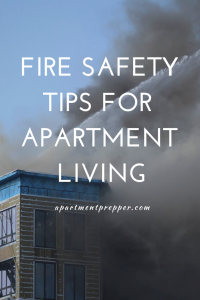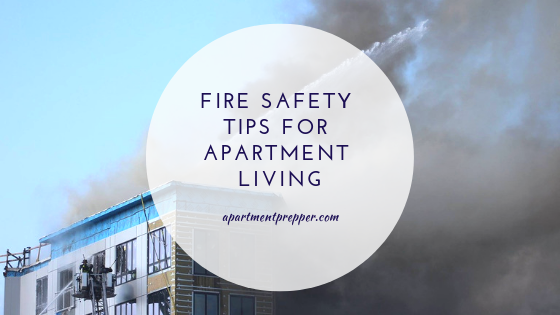By Bernie Carr
This article first appeared in The Allstate Blog
Fires are the most common disaster people are likely to experience yet many Americans underestimate the risk, according to the American Red Cross. Apartment fires, much like house fires, are caused by mishaps involving everyday activities such as cooking, heating, using appliances and electrical malfunctions, according to the U.S. Fire Administration (USFA). The good news is, most residential fires are preventable. Creating a fire preparedness plan can help keep you and your family safer. Get started with these apartment fire safety tips:
Declutter
Fire safety experts recommend that you keep your home as clutter-free as possible, according to the National Fire Protection Association (NFPA). Clutter allows fires to start easily and spread faster, particularly if items are too close to a stove or heating unit. Piles of stuff may also hinder you from exiting quickly in the event of a fire and block firefighters’ access to the unit.
Fire Safety Equipment
Never disable your smoke alarms. Make sure they are in good working order by testing them regularly, says Ready.gov. Remember to change your smoke alarm batteries when you set your clocks for daylight saving time. Report any malfunctions to your building management or landlord immediately.
It’s also important to keep a fire extinguisher in the kitchen and to know how to operate it. Read the instructions and be familiar with how your extinguisher works so that you can be prepared should you need to use it. If you’re unsure of whether or not it’s safe to use an extinguisher, the USFA recommends that you alert others of the fire, leave the building and then call 911 from a safe distance away. If you live in a high rise or in a unit that is far from the exit, you may want to consider a respirator to avoid smoke inhalation.
Minimize Your Risk
A little prevention goes a long way. These are a few things you can do (or not do) in your apartment to help minimize the risk of a fire:
Cooking
The NFPA offers these cooking safety tips:
- Stay in the kitchen while the stove or oven is on, and use a timer to remind yourself to check on the food regularly.
- Move any flammable items, such as dish towels, wooden utensils and cookbooks, away from the stove.
- Keep kids and pets away from cooking areas.
During a Power Outage
- Reach for a flashlight instead of candles to light your way.
Electrical Cords
The USFA recommends that you:
- Make sure all your power cords are in good condition with no exposed wiring.
- Do not hide electrical cords under carpets or rugs, as rugs can act as insulation, potentially causing a buildup of heat.
You may also want to use surge protectors to help protect your electrical equipment.
Space Heaters
They can make a room warm and cozy, but space heaters may cause injuries or a fire if they are not used properly, according to the Consumer Product Safety Commission (CPSC). Remember to:
- Turn off your space heater when leaving the room and when you go to sleep.
- Keep it away from curtains or other flammable materials.
Unplug Small Appliances
- Since electrical fires can be a concern, the CPSC recommends that you unplug small appliances when not in use — especially those that produce heat, such as toasters, hair dryers and flat irons.
Alert Your Landlord
- Report any fire hazards to your landlord or property manager, especially if you notice any smoke, sparks or crackling sounds from appliances or electrical outlets.
- To help ensure you have exits if there is a fire, make sure your windows are not painted or rusted shut and that stairways and fire exits are not blocked
Create a Fire Escape Plan
While you’ll hopefully never have a fire in your apartment, it’s important to know what to do just in case. Make sure you know where all the exit doors and stairwells are in your building, so you can get out as quickly as possible if needed. Also, plan at least two ways out of the building in case one is closed or blocked during a fire. Know where the nearest manual fire alarm is located, so you can alert everyone to the fire. It can also be helpful to hold fire drills, so that everyone in your household knows what to do in case of emergency. Designate a place outside where everyone should meet.
A little planning may also help you have important items on hand. It can be helpful to keep a “go bag” by your apartment entryway, in case you have to evacuate. You may also want to back up your important documents in a digital file so that you can still access them if the originals are destroyed, according to Ready.gov.
If a fire starts spreading, remember that your goal is to escape — not to extinguish the fire yourself. Remember to take the stairs and avoid using the elevator when there is a fire. Once you get out of the building, stay out and do not go back in for any reason. Let firefighters know if you think someone is trapped inside.
Though the threat of fire is always present, developing safer habits can reduce your risk. Take precautions and have a plan in place just in case.



I am a Red Cross volunteer and have seen first hand apartment fires. My husband and I are downsizing and my biggest fear is being realized! We are moving into an apartment complex YIKES! I am so anxious about the other residents and plan on being hyper-vigilent to their habits, etc. We will have escape plan in place along with our bug-out bags. (deep sigh)
Hi Cynthia, I am glad you are prepared with an escape plan and bug out bags- this is so important when living in a multi-family dwelling where the risk of fires is very high. I think fire is one of the biggest threats, even more that natural disasters. Thanks for the comment.